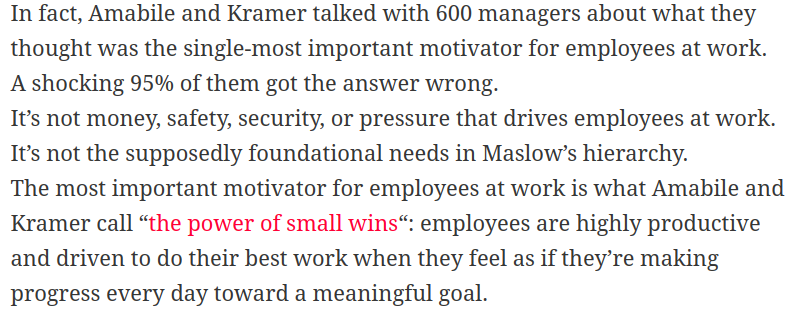Important paragraph, from here:
We’ve written before that why people work determines how well they work — that someone’s motive for doing a task determines their performance. Our work has shown that if a person’s motive is play (for example, excitement from novelty, curiosity, experimentation), purpose (the work matters), and potential (they are improved by the work), then their total motivation and performance increase. But if their motive is emotional pressure (shame, guilt, insecurity), economic pressure (mercenary behavior), or inertia (no motive), then total motivation and performance worsen.
Harvard Business Review article
This seems largely true to me. I don’t want to go down the whole “Start With Why” Simon Sinek rabbit hole, but it logically stands to reason that if a person is motivated by something like play (which we bury in adults) or purpose (ditto, often), they’re going to be better and more productive. We tend to get most discussions about “productivity” wrong, honestly.
And why is that? Well, look at the second half of the quote above. Many managers tend to “motivate” — you can’t even really call it that — from a place of “Hit your targets or else” (economic insecurity), emotional pressure, or absolutely no context other than “fucking do it.” We’ve all worked at the places where everything under the sun is urgent, which means nothing is urgent, even though no one has the stones to admit it.
Here’s a personal example. Once at a job, someone asked me to do an audit of competitor social media. I knew the top dogs in marketing could care less about social media, because it wasn’t a direct sales channel. I figured I’d be making a spreadsheet/doc for the sake of making a spreadsheet/doc, which is common at many jobs — i.e. checking boxes, or busywork.
In this case, I decided to push back and ask some basic questions, i.e.:
- What’s the strategy here?
- What will come from this audit?
- Who’s going to look at it?
- Should there be long-term recommendations in the doc?
Of course, none of these questions were answered. What did I get told? “Get it done, so-and-so needs it by Tuesday.” Did so-and-so even look at it once? Of course not. It was a completely meaningless task exercise. “We pay that kid and we don’t really understand his job role, so get him some shit to do while we’re over here working every sales channel possible.” That kind of deal. We’ve all been in it.
See how that project wouldn’t be motivational for me?
Right.
But a lot of managers don’t see that.
So why is that, then?
Honestly, a lot of managers just don’t understand what their job is. They think they got more money (which usually comes with management roles) to hit more targets. That’s part of it, sure. But now they usually have direct reports, which are human beings with lives outside of simply “hit your number.”
Part of your deal now needs to be motivating those people to do the best they can. The problem is, if your focus is “gotta hit more targets,” you probably become a micromanager. If you don’t become a micromanager, you usually go the absolutely opposite direction and go full absentee (never talk to your people), which is the silent killer of companies.
This confusion about what exactly management is explains the horrible global “engagement with work” rates in a nutshell.
And look, I get it — management isn’t exactly intuitive for a lot of people, and since we barely train new managers and often set them up with KPIs off a 1911 playbook, I can see why a lot of them fail.
But if you want to make work better, you need to make managers better. Managers dictate so much of how work feels for us. And if you want to make managers better, it’s a simple (yet very complex) 1-2 step, that being:
- Make them realize one of their jobs is to motivate and guide
- Make them understand how people feel motivated
“Get it fucking done because this person with a higher salary needs it” is not motivational, but sadly often normative. “I want you to work on this and the broader strategy will be this, and we’ll use it in that way?” That could be motivational. It’s definitely going to be more motivational than “This is an urgent project because the guy with the fancy car claimed he needs it, even though the only thing he actually looks at is sales scorecards.”
I was just wondering if I had ever written about managers and motivation, and lo and behold, I have: 95% of managers don’t understand motivation, from way back in October 2014. Wow. Guess that hasn’t changed much.
What else would you add on managerial motivation?

So true Ted! I am working on something around motivation because most people treat it like motivation from when we were kids “because I told you so” or something like that. Like the research, but wonder now that its confirmed that we don’t know how to motivate…what’s next.